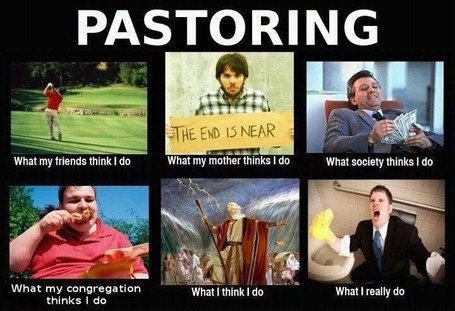That brings to the last thing I want to talk about and that is the pastor as model – sort of.
16 I urge you, then, be imitators of me. 17 That is why I sent you Timothy, my beloved and faithful child in the Lord, to remind you of my ways in Christ, as I teach them everywhere in every church.
Later in chapter 11 he says, famously, and rather boldly:
Imitate me as I imitate Christ.
In 2 Thessalonians he says:
“For you yourselves know how you ought to imitate us, because we were not idle when we were with you, nor did we eat anyone’s bread without paying for it, but with toil and labor we worked night and day, that we might not be a burden to any of you. It was not because we do not have that right, but to give you in ourselves an example to imitate.
And in 1 Timothy, where his giving advice to a young pastor, he urges:
“Let no one despise you for your youth, but set the believers an example in speech, in conduct, in love, in faith, in purity.”
Now, would you feel comfortable saying, “Hey, want to know how to be like Jesus? I’m all over it. Just watch me!” That would be incredibly cocky. I don’t think that is what Paul is saying though. Keep in mind that he is like a father to these people. He wants to see them grow as Christians, but he’s trying to figure out how to teach them to do it – how to introduce them to Jesus. He teaches out of the bible and writes them letters explaining things. So he’s making speeches and writing books. All right – that might work if people are really listening and have good memories but he knows that for a lot of us, that is not the case. And so he stays with these people and lives with them and works alongside of them and eats with them. He stayed with the Corinthians for a year and a half. They would have got to know him pretty well during that time. How can they best know more about how to live in light of the gospel? By observing more mature Christians.
What do kids pick up from us adults? Not just what you tell them to do. In fact, that’s only a small part of what they get from you. They pick up on how you act and how you talk. Act angry and they will think that acting angry is the way it’s done, even if you say otherwise. Work hard and they’ll think working hard is normal – just the way that you be human. Always got your iPhone out, dinking around and not listening to them? Must be OK. They’ll use the same phrases you do. It’s how they learn all their words. It’s how they learn all their categories. And how much of these can be communicated in a couple of pages of a letter? Can you get this stuff from reading a few bible verses? Nice try, but no way. That’s barely even the Cliff Notes. The real way to learn to be like Christ is to imitate someone else who is like Christ. If you are blessed, that person could be your father or mother or maybe a good friend and mentor you’ve met along the way. For a LOT of folks though, that is unfortunately not an option.
Who else did the people in Corinth have to imitate or look up to? They were first-generation Christians. They’re own parents were pagans. You can’t really look up to your own dad if (when he was still around) he would go hang out with the prostitutes down at the temple of Athena. There is your mother, but she has a couple of slaves she treats poorly and she thinks God is nonsense. That’s not a very good example. The Corinthians needed someone different to look up to for cues! There weren’t a lot of godly men and women around. Does anyone here come from a dysfunctional family? We’ll you’re not alone! You’re just like these folks that Paul was writing to in most of the New Testament. Congratulations! These letters are for people just like you.
You learn about the good news of God’s love and Jesus Christ’s work for you by hearing the gospel. But then how do you actually LIVE like a Christian? Well, you can read some of Jesus’s teachings like the sermon on the mount and get some clues, but you really are going to learn most of it by being around another person and imitating them. It’s how children learn pretty much everything and it’s how adults continue to learn most things. This is why good company can change your life for the better and the old proverb that “bad company corrupts good character” is, for most practical purposes, true. Your spiritual formation will be guided by who you look up to as a model.
One of my favorite Christian writers is Thomas Merton, and I’d like to quote you this passage he wrote about how our ideas of right and wrong are formed when we are children:
I cannot make good choices unless I develop a mature and prudent conscience that gives me an accurate account of my motives, my intentions, and my moral acts. The word to be stressed here is mature. An infant, not having a conscience, is guided in its “decisions” by the attitude of somebody else.
The immature conscience is one that bases its judgments partly, or even entirely, on the way other people seem to be disposed toward its decisions. The good is what is admired or accepted by the people it lives with. The evil is what irritates or upsets them. Even when the immature conscience is not entirely dominated by people outside itself, it nevertheless acts only as a representative of some other conscience.
The immature conscience is not its own master. It is merely the delegate of the conscience of another person, or of a group, or of a party, or of a social class, or of a nation, or of a race. Therefore, it does not make real moral decisions of its own, it simply parrots the decisions of others. It does not make judgments of its own, it merely “conforms” to the party line. It does not really have motives or intentions of its own. Or if it does, it wrecks them by twisting and rationalizing them to fit the intentions of another.
That is not moral freedom. It makes true love impossible. For if I am to love truly and freely, I must be able to give something that is truly my own to another. If my heart does not first belong to me, how can I give it to another? It is not mine to give!
When your heart is slave to sin, it is not yours to give away to other people. The good news of the gospel frees us to give to others for real – disregarding what society happens to think is right or wrong at the time. I think Paul’s ultimate goal is to free them to follow Christ. He doesn’t really want them to imitate him, personally. But it’s at least a good start before they can be handed off to a deeper relationship with their loving father God.
Now WHAT is it exactly about Paul that we imitate? His not getting married? No, definitely not. He clarifies that elsewhere that that is the way for only a small handful of folks. His job? Being a pastor? This is a big one that has often gone completely out of control some Christian circles today. When the pastor is put on a pedestal, you find that all the young men in the congregation aspire to be, you guessed it, pastors. Why? Because that seems like the most “meaningful” thing they could do with their lives. Being a plumber or a scientist or an insurance adjuster are temporal things that don’t “make a real difference in people’s lives”, but being a pastor or a missionary really DOES! Nonsense. Again, only a few people are called to this. The ones that are will probably find themselves driven crazy if they keep trying to go another way. The others (and that is most of you in this room) should do whatever their hands find to do with all their might. They should especially be concerned with their own families – their husbands, wives, and children.
The imitation of Christ is the end, the goal, the telos (that’s the Greek word for goal). But looking at someone farther along the path than you is a good way to get an idea of what way to go. It gives you an image of what it looks like. The trick is to not attach yourself TOO much to that person and their humanness, their mannerisms and such. That becomes trying to become someone you are not created to be. Don’t try to be someone you are not. The temptation for leaders (the ones being followed) is to force themselves a bit too much on their followers, or, to allow their follows to imitate them too closely. Does your role model speak truthfully, treat women kindly and drink alcohol only in moderation? Great! Follow his example. Does he also wear really tacky Hawaiin shirts? Don’t do that. They aren’t connected. Paul isn’t asking the people in the church to imitate his hair-do. He wants them to learn some of his character qualities – the fruit of the spirit in his life.
If you have a parent who was a medical doctor, it’s very common for the children to feel a lot of pressure from their parents to become doctors themselves, or perhaps at least lawyers or engineers. A good parent though will seek to understand his children’s psyche and help each one grow in a unique direction. He may help provide opportunities for them to follow in his own footsteps, but will not force them down that road. If he sees that his daughter would rather settle down and marry and have children, he won’t be always bugging her about her plans for grad school. The same goes for sons. The good father will help his son grow, but also allow him to find his own way in life. He’ll try to instill in his children his faith and values, but not so much his enthusiasm for the Seattle Mariners. That’s flimsy proposition anyway.
So, find good older and wiser men and women to learn from. It fills in many of the little details of life that you won’t find bible verses about. Your pastors here are not a bad place to start. There is a lot you can learn from them. If you have just been hanging out here at church for a while and haven’t really gotten to know them beyond watching them up here or having two-minute conversation in the hallway, I encourage you to get to know them more. They probably think about you and pray for you more than you realize. They aren’t here to look cool or pretend to be important. They want to serve you.
The modern world really has no concept of serventhood. It only understands raw independence and power. It thinks that if you “let” yourself be under someone like a pastor, or even disciplined by a parent or teacher, you are just giving them power and submitting to be oppressed. This is what Marxist philosophy is all about. Everyone is always just using and abusing each other all the time. Because we are sinners, it does look like that sometimes, but it is not how things work in the Kingdom of God – the Kingdom that Christ inaugurated. I encourage you to take Paul’s advice. Your pastors are here, the world doesn’t think much of them, but they love you and are wise and here to serve. Get to know them, watch them, and listen to them. They are worth imitating in many respects.
Now, Cody is my adopted son. You’ve probably noticed he doesn’t look anything like me. Where my son Seth has picked up my big round head and some of my mannerisms and personality traits through genetics, Cody gets from Erin and I only what he observes and hears each day first hand. He is athletic and charming and has a very short attention span. To ask him to imitate me by becoming a nerdy computer programmer who reads theology books for fun would be doing him a disservice. I don’t want him to pick up that from me. I want him to see me be faithful and keep my head on straight during stressful times and give God thanks through the good times and the bad.
I can see this happening all the time, like when he enthusiastically says his nighttime prayers with the same inflection as I do. Or when he asks for a cup of coffee every morning so he can be just like me. I also hear it when he loudly says something a bit embarrassing like “what the freakin’ heck!”. I’m afraid I must say that a bit too often. He’s also seen me when I was angry and irritable and said harsh and destructive things to him or when I have been depressed and distant and ignored him, and everyone else too. I hope he doesn’t remember those times very well and when he does later, I pray he can forgive me for the damage I’ve done. It’s more lasting that the damage that comes from smearing paint all over the house.
Fortunately, in the end, the pressure is really off me. I’m not God in this story. I get to be in Cody’s shoes, but looking up to a father in heaven who is infinitely loving, very slow to anger and never unjust. Our salvation comes not from following his example and obeying his commands, but from the work he alone did through Jesus Christ our Lord. It is my prayer that all of you may be able to meditate on that relieving fact.
Let us pray.
Father, thank you for being a good father, the very best, who will never leave us or forsake us, even when we forsake you. Thank you for being the good shepherd, who goes and looks for us in the middle of the night when we wander. Thank you for giving us stewards and faithful shepherds here in your church for the present time. Help us learn to love more freely as we keep our eyes rested, looking only to you. Amen.






